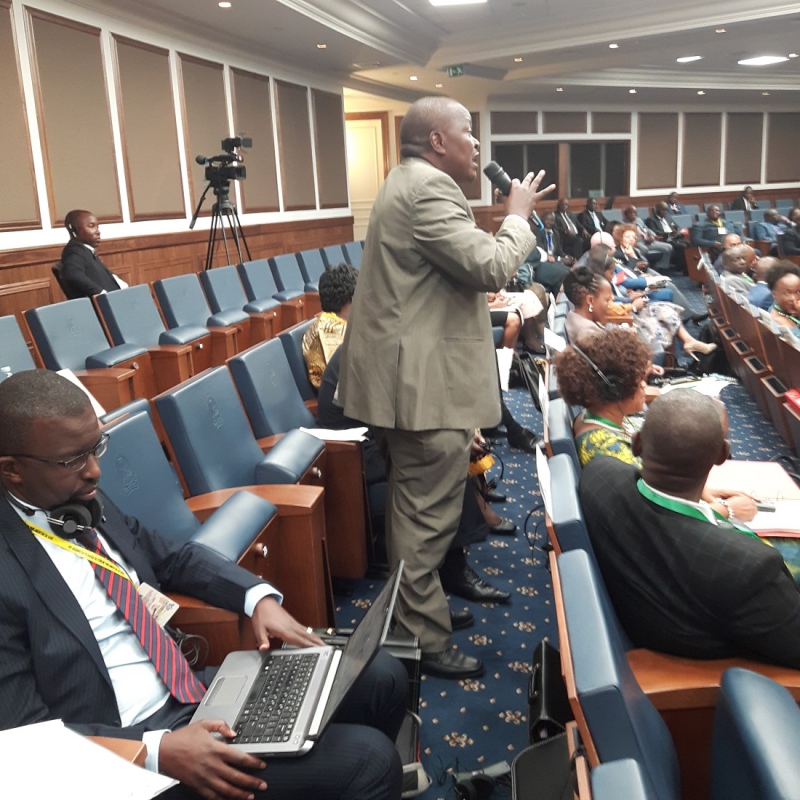
EABC appoints new Chair Person
Nairobi, Kenya: June 29, 2018: The East African Business Council appoints Mr. Nicholas Nesbitt from Nairobi, Kenya as the new EABC Chairman for the period 2018/2019 during the 19th Annual General Meeting (AGM). Mr. Nesbitt takes over from Mr. Jim Kabeho from Uganda who has served for the period 2017/18. Mr. Nicholas Nesbitt is also the Chairman of Kenya Private Sector Alliance (KEPSA) & General Manager Eastern Africa, IBM East Africa Limited.
Dr. Manu Chandaria, EABC Founding Chairperson in his remarks during the 19th AGM urged the Private Sector to be committed in the EAC Integration and spearhead for full inclusion of EABC in the EAC as a constituent member of the EAC Integration process.
“As the Private Sector our interest should be one East Africa and not our country.” Dr. Manu Chandaria, EABC Founding Chairperson emphasizes the need to for concerted strengthen Private Sector advocacy efforts at regional level.
In his acceptance remarks, Mr. Nesbitt reiterated the need to increase competitiveness of East African companies and SMEs to compete at continental as well as international level.
“Let’s focus on competitiveness of our businesses to sell our goods at regional, continental, and international scale ” said Mr. Nicholas Nesbitt.
He urged for close collaboration with the governments of the EAC Partners States and called for the government to improve the business environment support the operations of the Private Sector to thrive. The new chair also called for improvement of technological infrastructure to fast track free movement of goods and services in the region.
“Adopt technology such as block chain to solve regional challenges like counterfeits and contrabands” said Mr. Nicholas Nesbitt, new EABC Chairperson.
The East African Business Council also appointed Vice Chairs and Members of the EABC Executive Committee who strategically guide EABC’s mission to promote sustainable Private Sector driven growth. The Annual General Meeting (AGM) is the supreme policy making organ of the East African Business Council (EABC). The AGM meets once a year to elect the Executive Committee headed by the Chairperson, receive annual report on the initiatives undertaken by the Secretariat and give overall direction to the Secretariat in line with the Strategic Plan and interests of the business community in East Africa. The EABC Board of Directors consists of 22 members, headed by a Chairperson, elected from the Partner States on an annual rotational basis. Each country nominates 4 Members to the Executive Committee.
In his remarks, the outgoing Chairman Mr. Jim Kabeho lauded the EABC Secretariat for the good work that has been done in the year under review and congratulated the incoming board of directors, urging them to continue the ongoing initiatives of the EAC Integration process.
Mr. Nesbitt further appreciated efforts by the former chair Mr. Jim Kabeho in steering the work done in the year 2017 together with the Executive Committee. Mr. Nesbitt reiterated his commitment and passion to work with colleagues, Executive Committee members and requested full support from EABC Members, EABC National Focal Points, Secretariat, as well as the East African Community Secretariat, Organs & Institutions, Governments of the EAC Partner States and Development Partners.
During the 19th EABC Annual General Meeting, EABC also honored outgoing board directors for their distinguished service to the council in the year 2017.
-END-
Notes to Editors
About East African Business Council
The East African Business Council (EABC) is the regional apex body of Private Sector associations and Corporates from the 6 East African Countries. It was established in 1997 to foster the interests of the Private Sector in the Integration process of the East African Community. Being the representative of Private Sector associations in the region, EABC was granted observer status in organs and activities of the East African Community (EAC). EABC therefore participates in various sectoral meetings, meetings of the Coordination Committee, the EAC Council of Ministers, and the Summit of the EAC Heads of State; with a view to ensure, that the agenda of the Private Sector is well articulated and received by the policy makers.
Vision: Borderless East Africa for business and investment.
Mission: To promote sustainable Private Sector-driven growth.
EABC Membership is drawn from the six East African Partner States and is open to all national and regional associations as well as Corporates with interest in the EAC Integration process or operations in the region. At national level, EABC activities are coordinated through the EABC National Focal Points, who are also the national Private Sector umbrella bodies. These are Federal Chamber of Commerce and Industries Burundi (CFCIB), Kenya Private Sector Alliance (KEPSA), Rwanda Private Sector Federation (PSF), Tanzania Private Sector Foundation (TPSF) and Private Sector Foundation Uganda (PSFU).
For more information about EABC, visit
www.eabc.info

